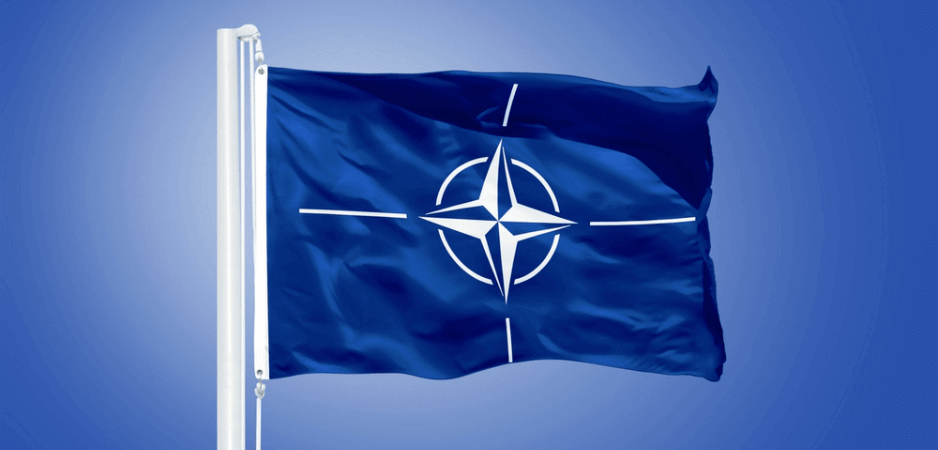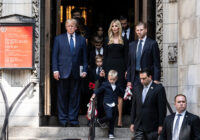Whatever Donald Trump says or does in Brussels, it will not be the end of NATO.
As the NATO summit in Brussels started its second day in disarray, what used to be an eventless and business-as-usual reconfirmation of unity and strength of the Atlantic alliance has turned into a power play between US President Donald Trump and NATO’s European members. Can the crisis still be avoided?
Back in May 2017, during Trump’s first visit to meet his NATO allies, even though things went relatively smoothly, a sentiment of frustration emerged. Allies had been expecting a formal commitment to Article 5 of the 1949 Washington Treaty — the central tenet of collective defense which postulates that an attack against one alliance member is an attack on all — yet Trump remained silent. It was left to Vice President Mike Pence and Secretary of Defense Jim Mattis to damage-control, underscoring that, words aside, America’s NATO commitment is clearly demonstrated by its actions.
A year later the situation has worsened. President Trump has been busy deconstructing President Barack Obama’s legacy, withdrawing from the Paris Climate Agreement and the Iran nuclear deal, shaking hands with North Korean dictator Kim Jong-un and — in just a few days’ time — meeting with Russian President Vladimir Putin. In every domain, Trump challenges traditional US foreign policy and its establishment. He prefers direct tweets to the soft and cautious wording of diplomatic communiqués and believes that his instinct and personal engagement with other world leaders can best serve his vision of America’s future. The end of the G7 summit last month in Canada was a first glimpse of what NATO allies have feared and, indeed, had already experienced.
Trump landed in Europe for a week-long series of meetings, convinced that America’s NATO allies have to do more, spend more on defense and, if not, they should be ready to face the consequences. America’s traditional support for Europe in the case of an armed attack is no more unconditional. What Trump says is not new, and the lament of European allies being free-riders and not spending enough on their own defense was the core message delivered by President Obama’s Secretary of Defense Robert Gates when he left office in 2011.
Yet Trump goes one step further by recalling the defense pledge made at the Newport Summit in September 2014, where allies agreed to increase their defense spending to 2% of their GDP. Just this morning, at an emergency session called after Trump’s renewed pressure on the alliance, he allegedly implied there may be “’grave consequences’” if allies do not immediately meet higher spending targets,” claiming victory during his press conference.
Last month, Trump wrote a personal letter to the leaders of NATO member states (including Norway, Canada and Germany) urging them to do better as it would become “increasingly difficult to justify to Americans citizens why some countries fail to meet our shared collective security commitment.” And no later than at the moment before boarding his flight to Europe, he said that meeting Putin would be easier than facing the NATO allies who “kill us on trade.”
Happy Anniversary
As the North Atlantic Treaty Organization is due to celebrate its 70th anniversary next year, it appears to be in better shape than a few years ago. Gone are the doubts that overshadowed its commitment in Afghanistan and disagreement over Libya. NATO has started doing its homework and got its act together. Back in 2014, only three of the 29 allies were spending 2% of their GDP on defense. In 2018, they are now five, and there may be eight by the end of the year.
What good is NATO if Germany is paying Russia billions of dollars for gas and energy? Why are there only 5 out of 29 countries that have met their commitment? The U.S. is paying for Europe’s protection, then loses billions on Trade. Must pay 2% of GDP IMMEDIATELY, not by 2025.
— Donald J. Trump (@realDonaldTrump) July 11, 2018
There is a way to go still, but this shows good will and seriousness, with at least 15 allies promising to reach the 2% mark by 2024. In less than four years, the allies have increased their defense spending by $45 billion, a number that demonstrates a willingness to contribute more. Of course, the crisis in Ukraine as well as other threats and risks at the margins of Europe have called for increasing up capabilities, but the trend has been upward.
From a military standpoint, NATO is also moving in the right direction. After two decades of crisis management operations, territorial defense and deterrence are back on the agenda. Military exercises, both in their training and diplomatic functions, have grown in number in response to Russia’s aggression. This fall, NATO plans to hold a military exercise — Trident Juncture 18 — in Norway, that would bring together more than 40,000 soldiers, something unheard of since the end of the Cold War. In the meantime, NATO Response Force has been upgraded to include a Very High Readiness Joint Task Force, acting as a “spearhead” and deployable within five days. Multinational battalions rotate in the Baltic States, protecting the east flank, whilst NATO air force scans the skies.
The alliance has also gone through a process of reorganizing its command structure, incorporating in its doctrine new elements dealing with hybrid and cyber threats whilst rethinking its partnership policy with other countries and organizations.
Not only will new headquarters be launched to deal with logistics and readiness issues, but the plan for the “four 30s” has been agreed upon, whereby allies commit to provide 30 mechanized battalions, 30 air squadrons and 30 ships under 30 days, in case of a major crisis. None of this cautions the idea of an “obsolete” organization, but instead reinforces the idea of a rejuvenated alliance.
What About Europe?
In addition, similarly to what happened at the Warsaw summit in 2016, NATO and the EU could sign a new joint declaration, insisting on getting the two organizations to cooperate better. The European Commission, which has for a long period of time only considered itself as a civilian actor, has recently launched the Permanent Structured Cooperation framework which has its roots in the 2007 Lisbon Treaty but hasn’t been enforced since then. The European Intervention Initiative, championed by French President Emmanuel Macron, insists on the necessary strategic autonomy of Europe, something that even post-Brexit United Kingdom supports.
The longstanding debate between transatlanticism and Europeanism no longer makes sense, as the discussions focus on the possibility of having both organizations share their know-how and experience in domains such as responses to hybrid threats or the need to bridge the gap in identified shortfalls.
The Brussels summit will surely surprise us, in a positive or a negative way. Whatever Donald Trump will do or say, it will not be the end of NATO, even in the (very unlikely) case of US withdrawal — a Gaullist posturing. One could say that Trump has already achieved what his predecessors aimed to do — namely, Europe playing an active part in its own defense. Isn’t that ironic?
The views expressed in this article are the author’s own and do not necessarily reflect Fair Observer’s editorial policy.
Photo Credit: Gilmanshin / Shutterstock.com
Support Fair Observer
We rely on your support for our independence, diversity and quality.
For more than 10 years, Fair Observer has been free, fair and independent. No billionaire owns us, no advertisers control us. We are a reader-supported nonprofit. Unlike many other publications, we keep our content free for readers regardless of where they live or whether they can afford to pay. We have no paywalls and no ads.
In the post-truth era of fake news, echo chambers and filter bubbles, we publish a plurality of perspectives from around the world. Anyone can publish with us, but everyone goes through a rigorous editorial process. So, you get fact-checked, well-reasoned content instead of noise.
We publish 2,500+ voices from 90+ countries. We also conduct education and training programs
on subjects ranging from digital media and journalism to writing and critical thinking. This
doesn’t come cheap. Servers, editors, trainers and web developers cost
money.
Please consider supporting us on a regular basis as a recurring donor or a
sustaining member.
Will you support FO’s journalism?
We rely on your support for our independence, diversity and quality.







